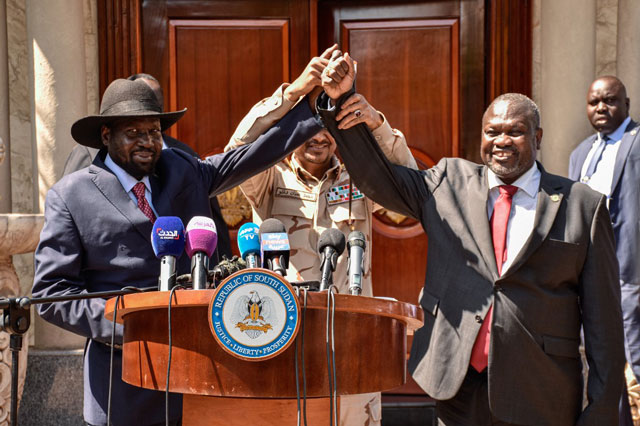
Juba, South Sudan | XINHUA | After five years of brutal civil war, several South Sudanese parties signed a revitalized peace agreement in the Sudanese capital Khartoum on September 12, 2018, following ten months of intense negotiations.
Two years on, the peace deal is yet to produce tangible results as political crisis and violence, food insecurity and economic meltdown continue to ravage the world’s youngest nation.
“I was happy when the peace deal was signed in September 2018 because I thought it was the end of the suffering,” said Majok Yen, who has lived in the UN Protection of Civilians (POC) site in Juba since 2013.
The initialization of the peace agreement provided renewed hope for a return to peace and stability in the east African country.
“I feel our leaders have let us down because for over two years, we are still suffering and people continue to die,” he added.
“We have been crying for peace to come to our country, but I’m disappointed that two years since the signing of the peace agreement, nothing much has changed in South Sudan and the people continue to suffer,” Nelson Sworo, a Juba resident told a local radio station on Saturday morning.
“I blame our leaders for the current problems because they only care about their own interests but not the common citizens,” he added.
According to a recent report by the United Nations Mission in South Sudan (UNMISS), sporadic violence has killed over 600 civilians in the past six months of 2020.
Half of the country’s population of an estimated 12 million people are food insecure, and over four million have been displaced both internally and externally.
“It is unacceptable for South Sudanese to continue bearing the burden and consequences of this conflict including impunity, rape, severe hunger, displacement and almost complete lack of services,” the Women Monthly Forum, a pressure group that brings together over 40 South Sudanese peace advocates, said in a joint communique on Friday.
The campaigners said that since the signing of the peace deal in 2018, nothing much has changed in South Sudan because violence, economic hardship and human rights abuses have continued unabated.
The group is particularly concerned about the recent escalation in fighting between government troops and forces of holdout rebel group, the National Salvation Front of Thomas Cirilo Swaka in Central Equatoria state and upsurge in inter-communal violence in several parts of the country.
“We note with concern that security is not only the absence of conflict but the guarantee of freedom of movement, access to resources, food, water, shelter and education, and more importantly a general sense of safety,” said the group.
South Sudan gained independence from Sudan in July 2011, but barely two years later, the young nation descended into civil war in December 2013.
A peace deal signed in August 2015 failed to contain the violence after it collapsed following renewed violence in the capital Juba in July 2016.
The 2018 revitalized peace agreement was signed by South Sudan’s President Salva Kiir, former rebel leader Riek Machar and several armed groups with the aim of ending the devastating civil strife.
But political commentator James Okuk opined that the peace deal has not yielded many benefits for the people of South Sudan since key provisions had not been implemented.
“The revitalization of the peace agreement has not progressed as expected and the two years have been wasted just talking on chapter one,” Okuk said.
Okuk, who is also a senior research fellow at the Center for Strategic Policy Studies, a Juba-based think tank, expressed concern that the revitalized peace deal may not be fully implemented within the 36-month timeframe because the parties have wasted 24-months without achieving much.
“Until now, the parties are still arguing on petty issues yet time is running out and we are remaining with one year to implement the peace agreement,” said Okuk.
He said that notable achievement in South Sudan’s peace process was the formation of the government of national unity in February, but he warned that the country’s path to peace remained bumpy and long.
“The parties are not really working in harmony to stabilize the country, so it is better the push comes from the people and the international community,” said Okuk.
He said that the peace agreement should be amended to allow South Sudan to go ahead with elections even though most parts of the pact remain unimplemented.
“The agreement should be amended so that we go for elections right away and the rest of the provisions that are not moving should be brushed aside so that we move on,” said Okuk.
“Otherwise if we stick to the content of the agreement, the remaining time is not enough to implement everything in it,” he added.
******
XINHUA
The post Two years after signing peace deal, South Sudan remains at crossroads appeared first on The Independent Uganda:.
from The Independent Uganda: https://ift.tt/2GMhFdx
0 Comments